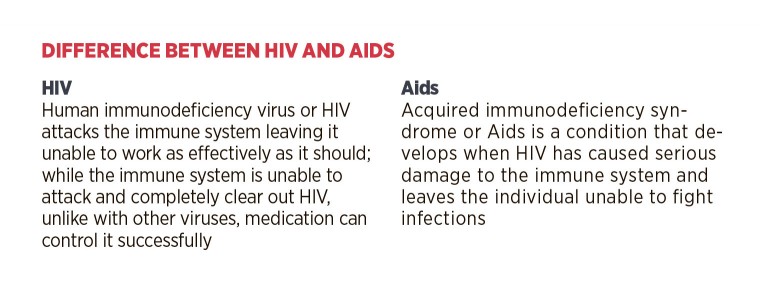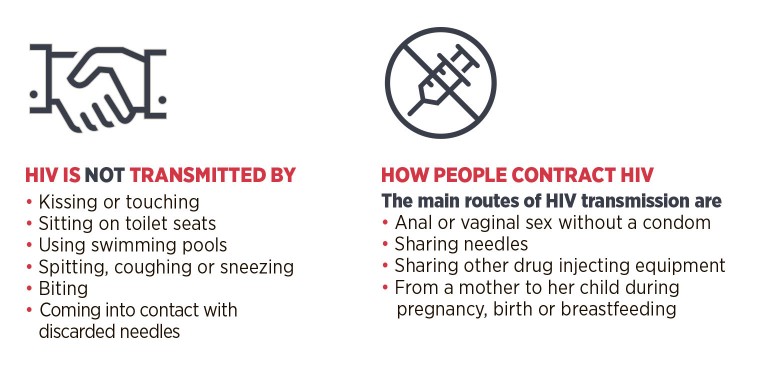Imagine you’re on a date. You’re really falling for this person and it’s getting serious. You’ve got butterflies, but it’s not just because you can’t wait to see them. You’ve got a secret they have to know. You’re HIV positive, but how are you going to tell? And, more importantly, what’s going to happen when you do?
“When I was younger I used to panic when I got close to sex,” says 24-year-old Alex, who is a deputy headteacher at a London school. “I wouldn’t know how to tell them or when to tell them. You have to bring it up in a way that’s right for both of you. It’s a different world – they have to come in and you have to be prepared for them to leave.”
Medical science has undergone a revolution since Aids exploded in the 1980s, but social attitudes have not caught up. Many people do not know or truly understand the difference between HIV – a virus that attacks the white blood cells which co-ordinate the immune system – and Aids which is when the body becomes unable to defend itself under attack from other illnesses.

Treatments are available that allow suffers of both to enjoy happy, fulfilled lives. Life expectancy for people with HIV, who are responding to treatment, is no different to anyone else in the population. New drugs mean that HIV-positive women are able to have children without the virus and breastfeed. In fact, if HIV is diagnosed and treated, the infection is often undetectable in clinical tests. If you’re undetectable, you can’t pass the infection on to others, even during sex.
Undetectable HIV
Paul, 51, is currently living with “undetectable” HIV. Diagnosed 13 years ago, he contracted the virus after going through a rough period in his life where he says he acted less responsibly than he normally would and had unprotected sex.
Today, he says he’s healthier than ever. At 51 years old, he ran the half marathon in Hackney in less than two hours earlier this year. His medication has no side effects and his NHS treatment has been impeccable. He takes better care of his exercise, diet and rest, and gets to check in with a doctor every six months which, as he says, is “more than most middle-aged men get to do”.
I’d never wish it on anyone, but out of the bad some good things can happen – it was an epiphany
“Nearly 15 years after I was diagnosed I can look back and say that it was a good thing to happen,” he says. “It made me reflect on my life and become more mindful. I changed career. It was a wake-up call. I’d never wish it on anyone, but out of the bad some good things can happen – it was an epiphany. You realise that life is short and that little things matter. We rattle on far too quickly. I feel fortunate.”
Not everyone in Paul’s life was able to react with such grace, or to believe that medical developments can genuinely stop HIV from becoming full-blown Aids or spreading to others.
“People were a bit wary at first,” he explains. “Some worried that I shouldn’t be around children. I could hear the anxiety if I had a cold and they thought something awful was happening, when actually it was just a cold. It’s like they are still reacting to what HIV was like 20 years ago. Society hasn’t caught up with the medicine.”
Diagnosed at birth
In some families, the fear and stigma is even stronger. Unlike Paul, Denisha is heterosexual and inherited HIV when she was a baby from her mother. Her family never talked about it. Although Denisha was diagnosed at birth, her mother found it so difficult to discuss that Denisha was told about her status by a charity worker at the HIV charity Body & Soul. She was just 11 when she was taken into a side room and given the news.
“At the time I was just getting into secondary school and trying to become a woman,” says Denisha. “I was interested in friends, looking a certain way and relationships, and suddenly I had this secret.
“Even though I didn’t know much about it [HIV], I did know about the stigma. I thought that everyone would find out and leave me – that’s the brutal punch – that I’ll have to hide this now. I couldn’t tell people why I had so many doctor’s appointments and pills. I had to stop speaking about this and build a fort.”

To this day Denisha hasn’t told anyone about her status. She found it very difficult not being able to talk about it to her mother, who only refers to it as “this condition”. The secrecy and stigma led to a downward spiral of alcoholism, depression and attempted suicide.
More than the virus, Denisha says it was keeping a secret that really drove her to despair. The psychological fall-out of the virus, more than the physical infection itself, was what plunged her into deep depression. It wasn’t biological, it was social. Although with the help of Body & Soul and HIV charity Mildmay she is back on her feet, and speaks with strength and grace about her recovery, she still hasn’t been able to disclose her condition.
Living with HIV
“I’ll date someone up to a certain point and then I’ll leave,” she says. “I don’t know how to get close. That fear of rejection is always there. People still see it as a ‘dirty disease’. I’d find any other excuse just to break up and avoid telling them. I’d say it was just how I felt. I can tell they don’t completely buy it and I know some people say they’d stick with you through anything, but they could just run for the hills.”
Of course, once you tell a partner, you’re not just worried about their reaction; you’re worried about other people’s too. When you’ve let that information out to an individual, you have no control over who else they might tell. In an age of social media, when the ability to spread information is faster than ever, this is one of the few reasons why having HIV today is harder than before.
As Denisha puts it: “Social media strikes fear into the hearts of everyone suffering. If one person posts something and it goes viral – people today are very cliquey. It’s like everyone wants to stick together. If one person is leading an attack on another, other people won’t condemn it. You have to go along with the crowd. Sometimes I hear my friends bringing it up and they’re so ignorant, but I have to be careful not to give myself away.”

In the mid-1980s when hysteria about Aids reached fever pitch, there might not have been Facebook to worry about, but there was a whole lot else to contend with. Maurice was diagnosed in 1984, finding out after a trip to the United States. When he and his partner were tested on their return, he came back positive and his partner negative.
When his HIV developed into full-blown Aids, the only drugs available were ALT (alanine transaminase). They were so toxic and had such side effects that he refused to take them. Since then he has taken a variety of new drugs as they have been introduced, and that has allowed him to have a full and happy life. Today he is 74 years old and as jolly as they come.
“When I found out, I was one year into my career in the theatre and I thought it would all end. My partner, who was given the all-clear at the same time, left me. He said it was nothing to do with the HIV, but…” he chuckles, “I’ve never been very lucky in love. But it’s no longer an issue because on these meds I’ve got the sex drive of a snail.
“So I went back to education to keep my brain active. I’ve got two degrees, I went globetrotting and helped with HIV charities. I’m planning another trip to Africa. I hope it comes across that you can live well with HIV.”
Raising HIV awareness
Now that medical science has progressed so much, it’s even more possible to speak about HIV with hope. Janet is one of the best examples of that. She was told when she was a teenager that she contracted HIV through mother-to-child transmission and, coming from a family with Ugandan roots, the stigma surrounding the virus in her community was strong.
I want to empower people and show them that my children are healthy – it’s only the stigma that causes the breakdown
But at 33 years old, she has fallen in love, disclosed her status to her partner and has two healthy, HIV-negative children; a little girl aged four and a little boy aged six. As a family, they often campaign together to raise awareness about HIV. “I want to empower people and show them that my children are healthy,” she says. “It’s only the stigma that causes the breakdown.”
For Janet’s mum, HIV felt like a death sentence. She didn’t have the choice of drugs that Janet does today and the stigma was toxic. Janet wants to do things differently. She plans to be completely open with her children, refusing to keep it a secret like her mum did with her. That way they won’t just grow up free from the virus, they’ll be free from the stigma that surrounds it.
Positive East is London’s largest HIV charity: positiveeeast.org.uk
NAZ is a black Asian and minority ethnic sexual health charity: www.naz.org.uk
National Aids Trust challenges myths and stereotypes with its Rethink HIV campaign: www.worldaidsday.org
Body & Soul supports people living with HIV: bodyandsoulcharity.org
Mildmay delivers care, treatment, prevention, rehabilitation, education and health systems improvement: www.mildmay.org

Undetectable HIV
Diagnosed at birth

